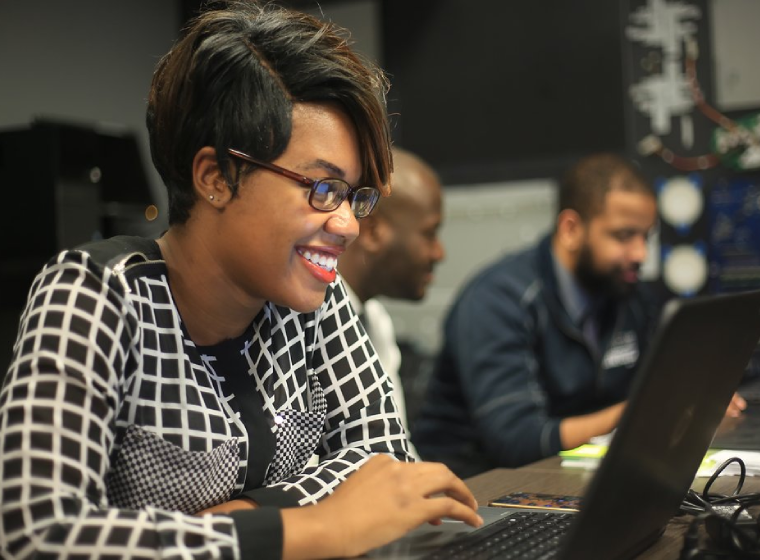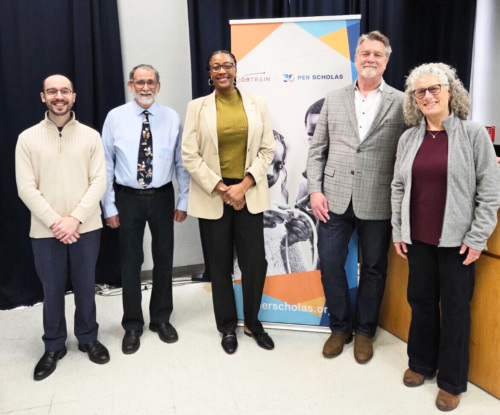
Uncertainty Takes Versatility
Overnight the world moved in-person operations to online and virtual interfacing. For many organizations and companies, the COVID-19 pandemic became a daunting task to shift day-to-day operations to virtual environments, determining which conference platform to use, and delivering the same quality of service to a target audience.
Per Scholas’ success, transitioning over 500 students and 200 staff members to a remote work structure in less than two weeks, took leadership, staff-creativity, and a twenty-five-year model built on the belief that agility and innovation are critical elements to succeed.
Leveraging Technology in Crisis
In December of 2019, Per Scholas began testing its latest blended learning training model. In this environment, two in-person classrooms are connected remotely and taught by an instructor who is physically present in one class and instructs another using remote learning technology.
As COVID-19 began spreading across the United States, Per Scholas leveraged this technology to quickly transition all in-person classes across 12 national sites to remote learning environments. Spearheaded by Senior Director of Program Development and Design, Eduardo Hernandez, the effort took the collaborative work of more than one-hundred instructors, technologists, curriculum designers, coaches, and staff. At the end of the first full-week of remote training, Per Scholas CEO and President, Plinio Ayala, commented, “we are quickly building new processes and systems to support all of our activities, virtual admissions, remote learning and support for our employer partners and community network. If there’s one thing that is at the core of the Per Scholas model it is human connection, and we are prioritizing that in this transition. Technology won’t work without it, and we don’t either.”
Prioritizing the student experience during this transition was important. Resources such as a student user guide and custom videos were created to help students and instructors leverage the learning management system and adjust to the new remote environment. “We have been doing remote learning for a while, at least a form of it, and we’ve been able to leverage this technology to support all of our students and their learning during this time,” said Magnardo Tavarez, Director of Program Innovation at Per Scholas, one of the senior staff overseeing the transition. Communications to Per Scholas partners, current students, and alumni were sent out via email and an ongoing web page providing updates to prospective applicants and currently enrolled students were created concerning operations during this time.
Overcoming Barriers to Remote Learning
Students who enroll in Per Scholas commit to learning every day, Monday-Friday, for seven hours of instruction, including breaks throughout the day. Students have designated workstations throughout their training and engage in hands-on activities as part of their curriculum. With the shift to remote learning, students and staff members needed to quickly adapt to new norms such as working and learning from home, which for some, current living circumstances or home environments might not be as accommodating. Other matters such as lack of access to a personal computer and internet also presented themselves as challenges.
To address the latter concern, a Loaner Program was established to provide technical hardware and equipment to all Per Scholas students and staff. Participants signed off to receive a laptop and/or MiFi device, which was on loan for the duration of their course. Video conferencing for instruction is a daily concern due to the large amounts of traffic to Zoom or Google Hangout servers. In the event of delays or connectivity issues, instructors prepared reading materials and hands-on assignments in advance so that student learning was not interrupted.
Corporate volunteerism was able to carry one with employer partners, such as TEKsystems, who conducted their sessions via video conferencing. One technical recruiter noted how appreciated and attentive the students were. “They made it feel like a normal class which was awesome. It felt rewarding and exciting to be in a position of guidance for those who could really use it. I [also] learned that I am able to be just as effective remotely.”
Students have adapted to the remote learning rather quickly and have continued building community during this transition. “We’ve reached a new level of friendship where we are not just classmates anymore,” states Diliana, a Per Scholas New York student in Network Support. “We’ve seen each other’s houses, helped each other with Zoom and WebEx, and talk to one another every day on Slack.”
The Future of Remote at Per Scholas
“Transitioning to a full-on remote operation for our training was already on my to-do list. I was already planning out a nice roll-out plan to support this process. However, the Coronavirus decided to speed up our timeline,” Magnardo chuckles.
The ability to pivot during tough times such as the one we find ourselves in now, including identifying best practices in a climate that has yet to settle itself, screams dystopian in the making. But it’s during these times, however, that Magnardo and his team are able to consider various projections, scenarios, and outcomes and identify familiarity within the uncertainty.
“[During this time], we saw our challenges, and what we needed to create to do this correctly. We can capitalize on this time to assess or update our existing operations so that we are ready for moments such as this.”
Sign up for our Monthly Impact Report
More News

Donate Now
Your support makes a powerful difference in our ability to build a technology talent training solution that creates greater access and equity.

